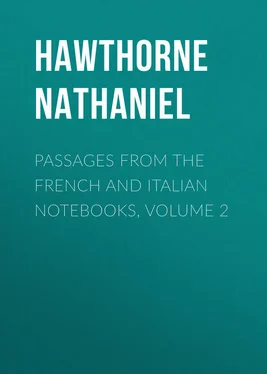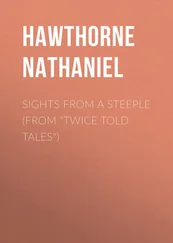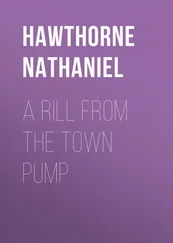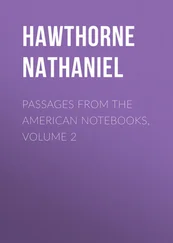Nathaniel Hawthorne - Passages from the French and Italian Notebooks, Volume 2
Здесь есть возможность читать онлайн «Nathaniel Hawthorne - Passages from the French and Italian Notebooks, Volume 2» — ознакомительный отрывок электронной книги совершенно бесплатно, а после прочтения отрывка купить полную версию. В некоторых случаях можно слушать аудио, скачать через торрент в формате fb2 и присутствует краткое содержание. Жанр: literature_19, foreign_antique, foreign_prose, на английском языке. Описание произведения, (предисловие) а так же отзывы посетителей доступны на портале библиотеки ЛибКат.
- Название:Passages from the French and Italian Notebooks, Volume 2
- Автор:
- Жанр:
- Год:неизвестен
- ISBN:нет данных
- Рейтинг книги:3 / 5. Голосов: 1
-
Избранное:Добавить в избранное
- Отзывы:
-
Ваша оценка:
- 60
- 1
- 2
- 3
- 4
- 5
Passages from the French and Italian Notebooks, Volume 2: краткое содержание, описание и аннотация
Предлагаем к чтению аннотацию, описание, краткое содержание или предисловие (зависит от того, что написал сам автор книги «Passages from the French and Italian Notebooks, Volume 2»). Если вы не нашли необходимую информацию о книге — напишите в комментариях, мы постараемся отыскать её.
Passages from the French and Italian Notebooks, Volume 2 — читать онлайн ознакомительный отрывок
Ниже представлен текст книги, разбитый по страницам. Система сохранения места последней прочитанной страницы, позволяет с удобством читать онлайн бесплатно книгу «Passages from the French and Italian Notebooks, Volume 2», без необходимости каждый раз заново искать на чём Вы остановились. Поставьте закладку, и сможете в любой момент перейти на страницу, на которой закончили чтение.
Интервал:
Закладка:
Mr. – , as usual, was homely and plain of manner, with an old-fashioned dignity, nevertheless, and a remarkable deference and gentleness of tone in addressing Mrs. Browning. I doubt, however, whether he has any high appreciation either of her poetry or her husband's, and it is my impression that they care as little about his.
We had some tea and some strawberries, and passed a pleasant evening. There was no very noteworthy conversation; the most interesting topic being that disagreeable and now wearisome one of spiritual communications, as regards which Mrs. Browning is a believer, and her husband an infidel. Mr. – appeared not to have made up his mind on the matter, but told a story of a successful communication between Cooper the novelist and his sister, who had been dead fifty years. Browning and his wife had both been present at a spiritual session held by Mr. Hume, and had seen and felt the unearthly hands, one of which had placed a laurel wreath on Mrs. Browning's head. Browning, however, avowed his belief that these hands were affixed to the feet of Mr. Hume, who lay extended in his chair, with his legs stretched far under the table. The marvellousness of the fact, as I have read of it, and heard it from other eye-witnesses, melted strangely away in his hearty gripe, and at the sharp touch of his logic; while his wife, ever and anon, put in a little gentle word of expostulation.
I am rather surprised that Browning's conversation should be so clear, and so much to the purpose at the moment, since his poetry can seldom proceed far without running into the high grass of latent meanings and obscure allusions.
Mrs. Browning's health does not permit late hours, so we began to take heave at about ten o'clock. I heard her ask Mr. – if he did not mean to revisit Europe, and heard him answer, not uncheerfully, taking hold of his white hair, "It is getting rather too late in the evening now." If any old age can be cheerful, I should think his might be; so good a man, so cool, so calm, so bright, too, we may say. His life has been like the days that end in pleasant sunsets. He has a great loss, however, or what ought to be a great loss, – soon to be encountered in the death of his wife, who, I think, can hardly live to reach America. He is not eminently an affectionate man. I take him to be one who cannot get closely home to his sorrow, nor feel it so sensibly as he gladly would; and, in consequence of that deficiency, the world lacks substance to him. It is partly the result, perhaps, of his not having sufficiently cultivated his emotional nature. His poetry shows it, and his personal intercourse, though kindly, does not stir one's blood in the least.
Little Pennini, during the evening, sometimes helped the guests to cake and strawberries; joined in the conversation, when he had anything to say, or sat down upon a couch to enjoy his own meditations. He has long curling hair, and has not yet emerged from his frock and short hose. It is funny to think of putting him into trousers. His likeness to his mother is strange to behold.
June 10th. – My wife and I went to the Pitti Palace to-day; and first entered a court where, yesterday, she had seen a carpet of flowers, arranged for some great ceremony. It must have been a most beautiful sight, the pavement of the court being entirely covered by them, in a regular pattern of brilliant lines, so as really to be a living mosaic. This morning, however, the court had nothing but its usual stones, and the show of yesterday seemed so much the more inestimable as having been so evanescent. Around the walls of the court there were still some pieces of splendid tapestry which had made part of yesterday's magnificence. We went up the staircase, of regally broad and easy ascent, and made application to be admitted to see the grand-ducal apartments. An attendant accordingly took the keys, and ushered us first into a great hall with a vaulted ceiling, and then through a series of noble rooms, with rich frescos above and mosaic floors, hung with damask, adorned with gilded chandeliers, and glowing, in short, with more gorgeousness than I could have imagined beforehand, or can now remember. In many of the rooms were those superb antique cabinets which I admire more than any other furniture ever invented; only these were of unexampled art and glory, inlaid with precious stones, and with beautiful Florentine mosaics, both of flowers and landscapes, – each cabinet worth a lifetime's toil to make it, and the cost a whole palace to pay for it. Many of the rooms were covered with arras, of landscapes, hunting-scenes, mythological subjects, or historical scenes, equal to pictures in truth of representation, and possessing an indescribable richness that makes them preferable as a mere adornment of princely halls and chambers. Some of the rooms, as I have said, were laid in mosaic of stone and marble, otherwise in lovely patterns of various woods; others were covered with carpets, delightful to tread upon, and glowing like the living floor of flowers which my wife saw yesterday. There were tables, too, of Florentine mosaic, the mere materials of which – lapis lazuli, malachite, pearl, and a hundred other precious things – were worth a fortune, and made a thousand times more valuable by the artistic skill of the manufacturer. I toss together brilliant words by the handful, and make a rude sort of patchwork, but can record no adequate idea of what I saw in this suite of rooms; and the taste, the subdued splendor, so that it did not shine too high, but was all tempered into an effect at once grand and soft, – this was quite as remarkable as the gorgeous material. I have seen a very dazzling effect produced in the principal cabin of an American clipper-ship quite opposed to this in taste.
After making the circuit of the grand-ducal apartments, we went into a door in the left wing of the palace, and ascended a narrow flight of stairs, – several tortuous flights indeed, – to the picture-gallery. It fills a great many stately halls, which themselves are well worth a visit for the architecture and frescos; only these matters become commonplace after travelling through a mile or two of them. The collection of pictures – as well for their number as for the celebrity and excellence of many of them – is the most interesting that I have seen, and I do not yet feel in a condition, nor perhaps ever shall, to speak of a single one. It gladdened my very heart to find that they were not darkened out of sight, nor apparently at all injured by time, but were well kept and varnished, brilliantly framed, and, no doubt, restored by skilful touches if any of them needed it. The artists and amateurs may say what they like; for my part, I know no drearier feeling than that inspired by a ruined picture, – ruined, that is, by time, damp, or rough treatment, – and I would a thousand times rather an artist should do his best towards reviving it, than have it left in such a condition. I do not believe, however, that these pictures have been sacrilegiously interfered with; at all events, I saw in the masterpieces no touch but what seemed worthy of the master-hand.
The most beautiful picture in the world, I am convinced, is Raphael's "Madonna della Seggiola." I was familiar with it in a hundred engravings and copies, and therefore it shone upon one as with a familiar beauty, though infinitely more divine than I had ever seen it before. An artist was copying it, and producing certainly something very like a fac-simile, yet leaving out, as a matter of course, that mysterious something that renders the picture a miracle. It is my present opinion that the pictorial art is capable of something more like magic, more wonderful and inscrutable in its methods, than poetry or any other mode of developing the beautiful. But how does this accord with what I have been saying only a minute ago? How then can the decayed picture of a great master ever be restored by the touches of an inferior hand? Doubtless it never can be restored; but let some devoted worshipper do his utmost, and the whole inherent spirit of the divine picture may pervade his restorations likewise.
Читать дальшеИнтервал:
Закладка:
Похожие книги на «Passages from the French and Italian Notebooks, Volume 2»
Представляем Вашему вниманию похожие книги на «Passages from the French and Italian Notebooks, Volume 2» списком для выбора. Мы отобрали схожую по названию и смыслу литературу в надежде предоставить читателям больше вариантов отыскать новые, интересные, ещё непрочитанные произведения.
Обсуждение, отзывы о книге «Passages from the French and Italian Notebooks, Volume 2» и просто собственные мнения читателей. Оставьте ваши комментарии, напишите, что Вы думаете о произведении, его смысле или главных героях. Укажите что конкретно понравилось, а что нет, и почему Вы так считаете.












